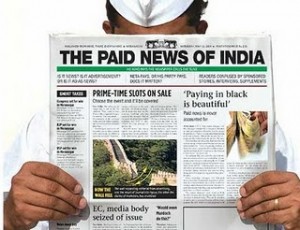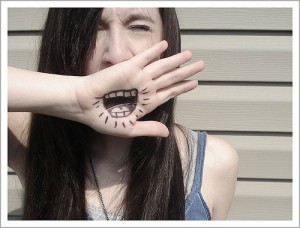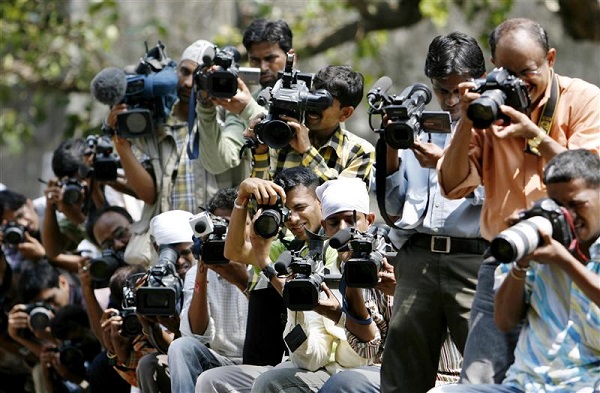It is the age of the instant response – and the age of the crudest name-calling against mediapersons and celebrities. We are so quick to take offence at the media commenting on things that affect us, that we resort to shooting the messenger instead of debating the message.
by Vrushali Lad | vrushali@themetrognome.in
Two days ago, we ran a story on how traders in Thane and Pune had all but called off their agitation against the LBT after Sharad Pawar’s intervention, and how traders in Mumbai were about to follow suit. See the story here.
We’d got quotes from Viren Shah, President of the FRTWA, who was part of the delegation that met Sharad Pawar on Sunday at the latter’s residence. We had excerpts from the press note that the FRTWA later issued, outlining the points discussed. Viren Shah even went on record to say that, “The FRTWA is against the LBT but our retailers will not down shutters. Business will go on as usual while the protest is on.” The story went live on Sunday evening, and Monday’s newspapers carried the same news with varying degrees of detail.
But on Twitter, at least five tweeters called us several names, the substance of their remarks being that we, like other media outlets in the country, were “paid media dogs” who were bribed by the Congress to spread rumours. “Pls do not spread rumours. Do u have a signed letter to confirm this?” asked one, the mildest of the lot, while another tweeted, “chal jhota, congress ne paisa diya hai kya rumours felane ka? #PAIDMEDIA #LBT” with an entertaining cartoon showing the Congress scamming everyone in sight. A little digging by our social media team found that this latter guy had been on a name-calling spree all afternoon, tweeting at every mediaperson on Twitter and calling them all #PAIDMEDIA. Some of these luminaries included journalists Rajdeep Sardesai and Barkha Dutt.
 I wonder if people really understand what this ‘paid media’ thing really is, though all and sundry use this phrase as freely as they use public streets as their personal dustbin. I always imagine this paid media business to be a situation where somebody comes to a media office with bags of money, plonks them on the editor’s desk and says, “There, I paid you. Now write nice things about me.”
I wonder if people really understand what this ‘paid media’ thing really is, though all and sundry use this phrase as freely as they use public streets as their personal dustbin. I always imagine this paid media business to be a situation where somebody comes to a media office with bags of money, plonks them on the editor’s desk and says, “There, I paid you. Now write nice things about me.”
I’m not saying things don’t necessarily pan out like that, either.
In recent times, we’ve been seeing a growing tendency in the country to take offence at everything. And, not content to merely take offence, we’re outraging all day about things that, in hindsight, were meant as a joke, albeit a not so funny one. Some of us are so outraged, we form packs of similarly-outraged persons and attack the offender all day.
Recently, a sarcastic tweet from stand-up comic Rohan Joshi, who was responding to a self-proclaimed feminist who’d accused him of being a male chauvinist, took up the Twitterati’s time for an entire day. And he wasn’t even being a chauvinist. A Firstpost.com article about how a new initiative to provide leftover food from one’s lunchbox to starving slum and street children was most likely a sham, prompted all and sundry to address the article’s writer with every possible swear word known to mankind, even as they jeered at his cynicism and asked how much money he’d been paid to write that piece.
And there’s no point responding, if you’re the writer of a particularly controversial piece, to such name-calling and trying to explain your point of view. Any such attempt only results in a bigger barrage of insults.
 We didn’t know this a few years ago, safely insulated as we were in our print media offices and our TV channel stations, how much hatred there was out there. Then the media’s working changed, to the extent that every bit of news and information put out there is compatible on all forums, most significantly, the web. And the Internet doesn’t do a very good job protecting us from instant, biting feedback the way other media can. Sure, there are such things as comment moderation tools, but what does one do when an article also has Facebook-enabled comments? Who’s going to disable Facebook?
We didn’t know this a few years ago, safely insulated as we were in our print media offices and our TV channel stations, how much hatred there was out there. Then the media’s working changed, to the extent that every bit of news and information put out there is compatible on all forums, most significantly, the web. And the Internet doesn’t do a very good job protecting us from instant, biting feedback the way other media can. Sure, there are such things as comment moderation tools, but what does one do when an article also has Facebook-enabled comments? Who’s going to disable Facebook?
Does this hate stem from the genuine fury consumers feel at seemingly important issues not being covered by the news media? The LBT strike, for instance, is over 25 days old, but apart from snippets on how closed shops are inconveniencing the public, has there been an in-depth piece on the issue by the electronic media? Even on Sunday, as trader organisations decided to suspend hostilities for a few days, news channels continued screaming headlines about one more player arrested in the IPL spot-fixing scam. Not a single LBT-related story surfaced at all that evening.
Or could a part of this hate be attributed to the clout the big media players enjoy, of being able to function well despite its consumers not liking most of the content they put out there  daily? In another business, for example, if people don’t like your product, you’re going to either take their feedback on board or shut shop. This doesn’t happen with say, The Times of India, which gets roundly criticised every single day for having more ads than news, or for biased reporting, or for peddling advertorials as news items. The TOI continues to function, and function well. Is that enough to make people so resentful that they start calling the TOI names and tell it to go to jump off a cliff?
daily? In another business, for example, if people don’t like your product, you’re going to either take their feedback on board or shut shop. This doesn’t happen with say, The Times of India, which gets roundly criticised every single day for having more ads than news, or for biased reporting, or for peddling advertorials as news items. The TOI continues to function, and function well. Is that enough to make people so resentful that they start calling the TOI names and tell it to go to jump off a cliff?
Or is it as simple as a lack of manners, of good breeding? Sensible people, when debating a point, argue with the person’s point of view. They don’t tell the person to his face that he is a jackass, or worse. In my eyes, you have to be totally moronic to say a person is a prostitute who sleeps around with Congress politicians and writes against the BJP, when what you really wanted to say was that the writer’s views had hurt their own and they begged to differ. Say what you wanted to say, don’t get into needless side issues about a person’s parentage or background or tendency to take bribes. Apart from being moronic, it is an unnecessary exercise in wasting time when, instead of debating the message, we shoot the messenger over and over again. Tell people they are wrong, certainly, but remember that you don’t really have the right to do so. A point of view is never right or wrong; it may be contrary or controversial.
And besides, how brave would you be if you had to say half those things to the mediaperson’s face, and not from behind your computer or phone’s screen?
Vrushali Lad is a freelance journalist who has spent years pitching story ideas to reluctant editors. Once, she even got hired while doing so.
(Pictures courtesy blogs.reuters.com, mag.bewakoof.com, pastorchrisowens.wordpress.com, www.sodahead.com)




